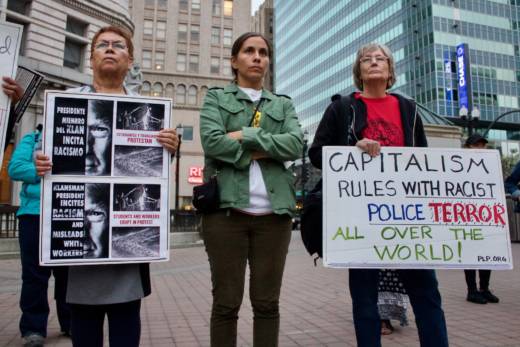The APTP is a coalition focused on ending murder and violence against communities of color by law enforcement agents. Asantewaa Boykin, one of the coalition’s co-founders, described it as a multigenerational and multi-ethnic group of organizations and community members that is “unapologetically black-led.”
“I think what is developing right now is so encouraging, that while we are not the majority, we are a very spirited group of people here,” said Walter Riley, a civil rights attorney, to those at Wednesday's meeting. “We’re seeing the rising tide of young people -- black people, white people, people of color -- saying, ‘Hell no, we’re not taking this system.’ ”
With the recent clashes surrounding conservative speakers and rallies at Berkeley, the coalition takes a multifaceted approach to organizing by linking its members with resources to heal from the trauma they may face during protests or police encounters.
“We’re essentially asking someone to traumatize themselves, and to do it voluntarily and with a certain amount of compassion,” Boykin said about the APTP’s first responders, the largest section of the coalition.
Confronting Trauma
The first responders receive training that teaches them how to treat injuries, conduct trauma-informed investigations and connect people with support and means of healing. The group believes this approach works as a preventative measure that addresses the need for healing before and after anticipated trauma.
“I think the simplest thing folks can do to take care of themselves, though it is a sacrifice of time and of space, is to allow themselves to feel the full range of that emotion. Because I believe feeling the full range of that emotion will alleviate it in a sense,” said Boykin, who is a registered nurse and wrote the first responders training guide.
Before the founding of APTP, the ONYX Organizing Committee was created following the fatal shooting of Oscar Grant by a BART police officer in 2009. ONYX leaders began to see the power they had to bring people into the streets at a moment’s notice, but they identified a need to focus more on preparedness.
“It kind of started to feel like we were waiting for black folks to be murdered by police and then we were reacting to that murder, versus doing something that was sustainable,” Boykin said.
The APTP was created to fill this gap. The coalition now consists of committees focused on action, legal issues, media, security, policy and first responders.
As the coalition takes a trauma-informed approach to organizing, Boykin would like to see more health care professionals assist community organizations in filling the gap to facilitate healing from trauma induced by law enforcement. She does not believe police institutions have a place in this process.
“That’s like asking someone who has been abused to go sit down and have a conversation with the person that abused them,” Boykin said. “We would not apply that equation in any other situation. That would be considered ridiculous.”
The APTP has taken the issue into its own hands by training volunteers about cultural sensitivity, trauma-informed interviewing, first aid training and connecting people with resources like its monthly support group.
As of the time of publication, Berkeley had not issued a permit for the march, according to Berkeley police spokesman Sgt. Andrew Frankel.
“This march was organized so that we can take the streets on our own terms,” the event’s Facebook page states. “Counter-demonstrations are very important, but we live here, this is our community, and every day is a good day to be united against white supremacy.”

